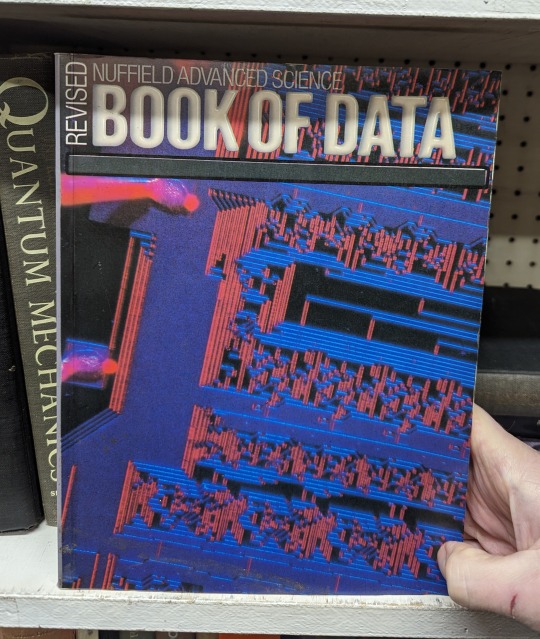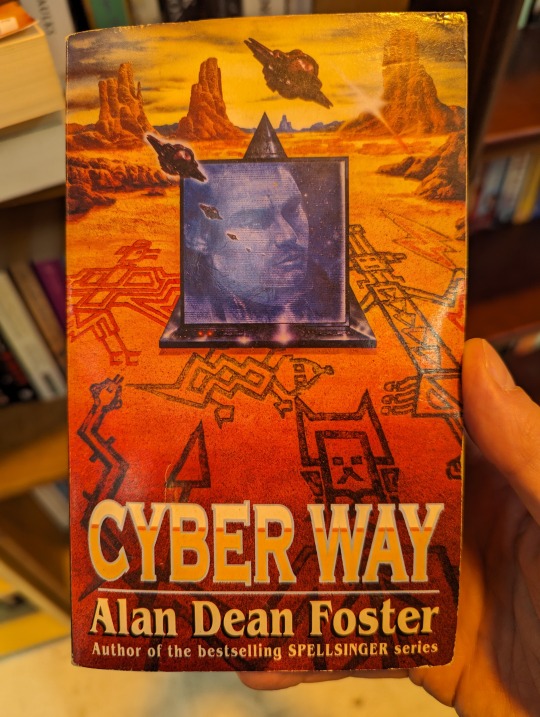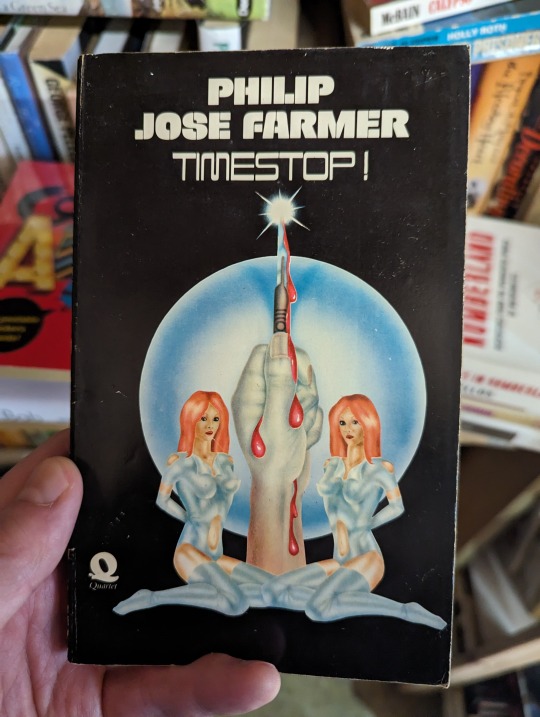#gregory benford
Explore tagged Tumblr posts
Text
Reading Gregory Benford's novel Timescape (1980) in 2024 is kind of depressing because, on the one hand, it depicts a horrible climate dystopia that's steadily getting worse, but on the other hand, it assumes that international governments will take the problem seriously and actually take proactive steps to enforce conservation and remediate the problem.
Also, tachyons don't exist in real life (to our knowledge)
62 notes
·
View notes
Text

Vertex, Volume 1/Number 5, Mankind Pub. Co., December 1973
#witches#vertices#occult#vintage#vertex#magazine#sci-fi#mankind publishing company#los angeles#volume one/number five#mankind#science fiction#heinlein#george barr#sidney coleman#gregory benford#december 1973#1973#sociology#medicine#kevin davidson#science
23 notes
·
View notes
Text

Gregory Benford - In The Ocean Of The Night (1978) (Peter Andrew Jones)
101 notes
·
View notes
Text






More books that caught my eye lately:
Timescape - Gregory Benford (1980)
Book of Data - Nuffield Advanced Science (1984)
Where Wizards Stay Up Late: The Origins of the Internet - Katie Hafner/Matthew Lyon (1996)
Cyber Way - Alan Dean Foster (1990)
Timestop! - Philip José Farmer (1960)
Fly Fishing - J.R. Hartley (1991)
75 notes
·
View notes
Text

tom_geraghty
"Any technology distinguishable from
magic is insufficiently advanced."
Gregory Benford
Jul 8, 2023 at 11:33:13 AM

Ink: Diamine Beethoven
20 notes
·
View notes
Text
Episode 200 - Library Fiction
It’s episode 200, which means it’s (finally) time for us to discuss Library Fiction! We talk about the stereotypes and tropes of library fiction, unacknowledged work of library workers,and more. Plus: we talk way more about our actual jobs than we usually do.
You can download the podcast directly, find it on Libsyn, or get it through Apple Podcasts or your favourite podcast delivery system.
In this episode
Anna Ferri | Meghan Whyte | Matthew Murray 🦇 | Jam Edwards
Things We Read (or tried to…)
Labyrinths: Selected Stories & Other Writings by Jorge Luis Borges
The Book That Wouldn’t Burn by Mark Lawrence
Ex Libris: Stories of Librarians, Libraries, and Lore by Paula Guran (below are direct links to many of the stories from this collection)
In the House of the Seven Librarians by Ellen Klages
In Libres by Elizabeth Bear
Those Who Watch by Ruthanna Emrys
Paper Cuts Scissors by Holly Black
Summer Reading by Ken Liu
Magic for Beginners by Kelly Link
With Tales in Their Teeth, From the Mountain They Came by A.C. Wise
The Librarian’s Dilemma by E. Saxey
The Green Book by Amal El-Mohtar
A Woman's Best Friend by Robert Reed
If on a Winter's Night a Traveler by Xia Jia, translated by Ken Liu
The Sigma Structure Symphony by Gregory Benford
The Fort Moxie Branch by Jack McDevitt
The Last Librarian: Or a Short Account of the End of the World by Edoardo Albert
How Can I Help You by Laura Sims
Strange the Dreamer by Laini Taylor
Souls in the Great Machine by Sean McMullen
Other Media We Mentioned
The Library of Mount Char by Scott Hawkins
The Empty Crown by Rosemary Edghill
Meghan meant The Abortion by Richard Brautigan (not Trout Fishing in America)
The Midnight Library by Kazuno Kohara
The Invisible Library by Genevieve Cogman
Bookhunter by Jason Shiga
Unshelved by Gene Ambaum and Bill Barnes
Library Comic by Gene Ambaum and Willow Payne
Welcome to Night Vale
Piranesi by Susanna Clarke
Episode 134 - Piranesi by Susanna Clarke
We Have Always Lived in the Castle by Shirley Jackson
Abbott Elementary
Pounded In The Butt By My Handsome Sentient Library Card Who Seems Otherworldly But In Reality Is Just A Natural Part Of The Priceless Resources Our Library System Provides by Chuck Tingle
My Librarian Is A Beautiful Lesbian Ice Cream Cone And She Tastes Amazing by Chuck Tingle
Party Girl
Public Enemy - Fight the Power
Fictional Librarians
50 Fictional Librarians, Ranked
Rupert Giles (Buffy the Vampire Slayer)
Barbara Gordon (DC Comics)
The Librarian (Discworld)
Lucien (The Sandman)
Evelyn Carnahan (The Mummy)
Marian Paroo (The Music Man)
Librarians (Welcome to Night Vale)
“While their description is never fully given, minor details of their physical characteristics have been described:”
yellow, gnarled teeth
sharp claws and pincers
Wings
Tentacles
thousands of spiny legs
rattles (that make noise when they move)
thoraxes
Links, Articles, and Things
Two-Fisted Library Stories zines
North Boulder Library is ready to open (there’s a slide in image 6!)
15 Librarian & Library Fiction by POC Authors
Every month Book Club for Masochists: A Readers’ Advisory Podcasts chooses a genre at random and we read and discuss books from that genre. We also put together book lists for each episode/genre that feature works by BIPOC (Black, Indigenous, & People of Colour) authors. All of the lists can be found here.
The Reading List by Sara Nisha Adams
What You Are Looking for Is in the Library by Michiko Aoyama, translated by Alison Watts
Cora's Kitchen by Kimberly Garrett Brown
The Next Best Fling by Gabriella Gamez
The Woman in the Library by Sulari Gentill
The Library of the Dead by T.L. Huchu
The Library of Fates by Aditi Khorana
The Plotters by Kim Un-Su
The Very Secret Society of Irregular Witches by Sangu Mandanna
The Memory Librarian: And Other Stories of Dirty Computer by Janelle Monáe
Our Missing Hearts by Celeste Ng
The Book of Form and Emptiness by Ruth Ozeki
The Library Thief by Kuchenga Shenjé
The Cartographers by Peng Shepherd
Bookhunter by Jason Shiga
Give us feedback!
Fill out the form to ask for a recommendation or suggest a genre or title for us to read!
Check out our Tumblr, follow us on Instagram, join our Facebook Group or Discord Server, or send us an email!
Join us again on Tuesday, October 1st we’ll be getting ready for spooky season with the Weird West! (That’s Supernatural Horror Westerns)
Then on Tuesday, October 15th it’s time for our “We All Read the Same Book” episode as we discuss A Wizard’s Guide to Defensive Baking by T. Kingfisher.
4 notes
·
View notes
Text

Quando la chimica è quella giusta, tutti gli esperimenti funzionano.
Gregory Benford
3 notes
·
View notes
Text
TACHYONIC ANTITELEPHONE
STRAY KIDS “ASTRONAUT” MV THEORY

A tachyonic antitelephone is a hypothetical device in theoretical physics that could be used to send signals into one's own past.


Albert Einstein in 1907 presented a thought experiment of how faster-than-light signals can lead to a paradox of causality, which was described by Einstein and Arnold Sommerfeld in 1910 as a means “to telegraph into the past”. The same thought experiment was described by Richard Chace Tolman in 1917; thus, it is also known as Tolman's paradox.


A device capable of “telegraphing into the past” was later also called a “tachyonic antitelephone” by Gregory Benford et al.
Wikipedia, Science Pie
1 note
·
View note
Text
“Any sufficiently advanced technology is indistinguishable from magic.” ―Arthur C. Clarke
“Any technology distinguishable from magic is insufficiently advandced” ―Gregory Benford
0 notes
Text
A Bewitching Monday
A Round-Up of Daily Virtual Book Tour Stops
Tales of the Wythenwood Book One by J.W. Hawkins Virtual Book Tour https://www.mommasaystoread.com/2024/09/tales-of-wythenwood-book-one-by-jw.html
Experience these powerful new voices—vivid, visceral, and visionary—as they explore uncharted worlds and reveal unlimited possibilities.
Writers of the Future Volume 40
“Deliciously unpredictable and absolutely engrossing, Nicola Solvinic’s The Hunter’s Daughter is one of the best debuts I’ve read in a very long time. With a dash of magical realism and the kind of complicated, conflicted heroine I love, Solvinic pulls off a nearly impossible feat: making the reader care about a woman who may well be following in her serial killer father’s footsteps. Put The Hunter’s Daughter at the top of your TBR list—I loved this book!” —Karen Dionne, bestselling author The Marsh King's Daughter The Hunter’s Daughter by Nicola Solvinic https://amzn.to/48NTMdP https://bit.ly/3YDcQHB #nicolasolvinic #mysteryauthor #crimeauthor #thrillerwriter #criminology #criminologymastermind #crimefiction #crimethriller #crimenovels #detectivenovels #suspensenovels #thrillerbooks #murdermystery #mysteryseries #whodunit #mysteryreads #bookcommunity #mustread #bookrecommendation #bookish #booklovers #readinglist #bookclub #bestseller
Check in for chills, check out with goosebumps: Explore Michigan's haunted hotels with author, Roxanne Rhoads. Haunted Hotels of Michigan https://amzn.to/3Touz4p #MichigansMostHauntedHotels #MichigansMostHaunted #HauntedMichigan #MichiganGhosts #GhostlyGetaways #MichigansGhostlyGetaways #HauntedTravel #GhostTravel #GhostTourism #HauntedTourism #DarkTourism #HauntedHotelsofMichigan #MichigansHauntedHotels
As an Amazon Influencer, I earn from qualifying purchases #Amazon #ad #CommissionsEarned
0 notes
Link
The multiverse may be a cool (and convenient) concept for comic books and superhero movies, but why do scientists take it seriously? In a new book titled “The Allure of the Multiverse,” physicist Paul Halpern traces why many theorists have come to believe that longstanding scientific puzzles can be solved only if they allow for the existence of other universes outside our own — even if they have no firm evidence for such realms. It’s easy to confuse the hypotheses with the hype, but Halpern says there’s a huge difference between the multiverse that physicists propose and the mystical realm that’s portrayed in movies like “Doctor Strange in the Multiverse of Madness.” “Some people accuse scientists of trying to delve into science fiction if they even mention the multiverse,” Halpern says in the latest episode of the Fiction Science podcast. “But the type of science that people are doing when they talk about the multiverse is real science. It’s far-reaching science, but it’s real science. Scientists are not saying, ‘Hey, maybe we can meet another Spider-Man and attack Kingpin that way.'” On one level, the concept of a multiverse — encompassing the paths that the universe takes as well as the roads not taken — addresses our instinct to wonder “what if” (which happens to be the title of a Marvel multiverse comic-book series). For example, what if Marty McFly’s mother missed out on meeting his father in “Back to the Future”? “This whole idea of ‘which world is better, which world is worse’ — this is something people think about a lot, and inspires notions like the multiverse, where you imagine what would have happened if the universe developed differently, what would have happened if history was different,” Halpern says. “It’s a very popular question for us, and could well stem from our survival instincts in terms of planning.” Multiplicity of multiverse motivations “The Allure of the Multiverse: Extra Dimensions, Other Worlds and Parallel Universes,” by Paul Halpern. (Basic Books) For physicists, however, the multiverse isn’t a matter of wondering where they’d be if they went for an MBA rather than a Ph.D. Instead, the idea pops up in several scientific contexts. Quantum mechanics gave rise to deep questions about how the act of observation affects the reality being observed. The effort to answer those questions led some physicists to theorize that reality splits into different versions that go their separate ways, in line with what’s now known as the Many Worlds Interpretation. On a different front, physicists have tried to reconcile the seemingly inconsistent implications of quantum mechanics and general relativity by proposing the existence of extra dimensions. These physicists say the inconsistencies can be mathematically resolved if there are, say, six or seven undetected dimensions in addition to our universe’s four-dimensional spacetime. A field of physics known as brane cosmology speculates that other realms of existence (or “branes,” short for membranes) could exist in parallel to our own realm. And then there’s the Big Bang. To explain what they’re observing on the far frontiers of our accelerating universe, astrophysicists have proposed that the cosmos got its start in a bubble burst of inflation. Some have followed the trail even further, concluding that there’s no reason why our universe couldn’t spawn a multitude of bubble universes with different properties. (Sci-fi author Gregory Benford worked the idea into a 1998 novel titled “Cosm.”) Where’s the evidence? Paul Halpern is a professor of physics at Saint Joseph’s University. (Image courtesy of Saint Joseph’s U. via Basic Books) In his book — and in our podcast — Halpern traces the development of these theories, as well as efforts to track down evidence showing that a particular conception of the multiverse is correct. Scientists have searched for traces of the multiverse at work in the temperature variations of cosmic microwave background radiation — the so-called afterglow of the Big Bang. They’ve tried to detect primordial gravitational waves that could tell them about the history of cosmic inflation. They’ve looked for signs of gravitons at the Large Hadron Collider, or small-scale variations in the force of gravity that could point to interactions with extra dimensions. So far, these scientists have struck out. Some have even given up, after concluding that the multiverse hypothesis is an unprovable “theory of anything” and therefore shouldn’t be considered science. Despite the strikeouts, Halpern hopes physicists will keep on swinging. “The argument against even considering multiverse models is the lack of observational evidence,” he says. “However, there are many new tools in science that could be used to probe what happened at the beginning of our universe, right after the Big Bang.” Fine-scale measurements of polarization patterns in the cosmic microwave background radiation could still turn up evidence of “scars” left behind by collisions with other bubble universes. There’s still a chance that gravitational-wave surveys could reveal evidence of interactions with other universes. “And finally, there’s a burgeoning area of simulating cosmology, and looking to see what models suggest the production of other universes,” Halpern says. “That wouldn’t be experimental proof, but that would provide an important clue as to whether or not you can have our universe with what we believe is an initial state of ultra-rapid expansion called inflation.” So, is the multiverse for real? Halpern is optimistic that scientists will eventually find ways to answer that question, even though they’ve found nothing but dead ends so far. “I look at the history of physics, and there are so many things that started with false starts,” he says. Halpern points out that it took decades for physicists to find sufficient evidence for the existence of dark matter and dark energy, black holes and gravitational waves — long-shot efforts that led to Nobel Prizes. “We have to be patient sometimes with theoretical physics and its predictions,” he says. Head on over to the original version of this posting on Cosmic Log to get Paul Halpern’s reading recommendations for multiverse mavens. For still more about the multiverse, check out our previous Fiction Science interview with string theorist Brian Greene — plus a doubleheader with physicist Michio Kaku talking about “The God Equation” and “Quantum Supremacy.” My co-host for the Fiction Science podcast is Dominica Phetteplace, an award-winning writer who is a graduate of the Clarion West Writers Workshop and currently lives in San Francisco. To learn more about Phetteplace, visit her website, DominicaPhetteplace.com. Stay tuned for future episodes of the Fiction Science podcast via Apple, Google, Overcast, Spotify, Player.fm, Pocket Casts and Radio Public. If you like Fiction Science, please rate the podcast and subscribe to get alerts for future episodes. The post Why Serious Scientists Are Mesmerized by the Multiverse appeared first on Universe Today.
0 notes
Video
youtube
Gregory Benford - What Would Intelligent Aliens Mean?
0 notes
Text
• The existence of a well-defined problem does not imply the existence of a solution. —Gregory Benford

Tides of Light Tides of Light (at Internet Archive)

0 notes
Text

Good morning! I hope you slept well and feel rested? Currently sitting at my desk, in my study, attired only in my blue towelling robe, enjoying my first cuppa of the day. Welcome to Throwback Thursday!
Many thanks to everyone that contributed to WEDNESDAY WORDS yesterday. Every week, it just gets better! An amazing selection of lyrics, poems, words of wisdom, great lines from films and old folks’ sayings. And well done to clever Roz Pedersen, who photographed one of those ‘Poems On The Underground’ and posted that! I’ve always applauded TFL for bringing some art to London’s underground trains.
On this page, ‘Throwback Thursday’ is about memories. So, what do you remember? If I was to say the word IN-LAW, what immediately comes to mind?
Old school comedians used to run jokes about their mother-in-law. Not anymore. Happy wife = happy life, and your wife will always be happy if you get on with her parents.
I guess I was lucky? My in-laws are amazing! The Trouble’s mum has passed now but her dad is still hanging in and up for a drink and a game of dominoes!
By the time I came on to the scene, The Trouble’s sister already had her boyfriend living in her bedroom! So, when The Trouble asked if I could move in to the family home, her parents were not surprised.
That’s right: Mr. and Mrs. Patterson had twin girls and their boyfriends both lived in the family home. Madness, right? Well, Mr. Patterson didn’t think so. He would rather he knew exactly where his daughters were and who they were with! So, my in-laws were incredibly kind, patient and tolerant, and Mrs. Patterson made me cornmeal porridge (with sliced white bread and butter) and, when I was sick, boiled down some cerasee and forced it down my throat!
So, on this Throwback Thursday, what kind of memories does the word IN-LAW conjure up for you?
While looking for material for Wednesday Words, I thought I’d include the first few lines from J. D. Salinger’s brilliant ‘The Catcher In The Rye’. I looked it up on Google and underneath it were some reviews. The first one I saw had awarded this core-curriculum book just one star! The first two words of the review read, “Bro awful.” No comma between ‘bro’ and ‘awful’. It told me all I needed to know about the reviewer. He continues, “I promise I'm usually a nice guy, but this just got on my nerves lol.” Lol? What adult includes ‘lol’ in a book review? It reminded me that there’s no accounting for taste. Even the classics get bad reviews! I’ve only had one one-star review for ‘Whatever Makes Them Dance’. The reviewer said, “Like reading a schoolboy diary.” She’s absolutely right. That’s how I write. That is my writing style. No denying it. Thankfully, most people like the story and my characters. That’s always my focus: story and characters. But, seriously, one star for ‘The Catcher In The Rye’? Science fiction writer Gregory Benford once said, “Maybe education is wasted on the young?”
In amongst all the prepping, teaching, marking and moderating, in coming weeks, we’ve got lots to look forward to. We have a yummy BBQ on Saturday, another groovy garden party on July 8th, then I’ll be doing Mi-Soul’s ‘Concert At The Castle’ event in Windsor on July 9th. I’m covering ‘Mi-Drive’ on July 20th and July 27th. It’s the Margate Soul Festival on the weekend of August 4th, we’re going to see Dolly on August 12th, then I’m looking forward to going back to Stevenage on Bank Holiday Sunday, August 27th for ‘Let The Music Play’. And, of course, we’ll be back and forth to Hove regularly to see Lady Wesker
Have a throbbing and thrusting Thursday (with hopefully a few thrills through your thoroughfare?) I love you all.
#mixcloud#mi soul#dj#music#new blog#lockdown#coronavirus#books#weekend#democracy#brexit#cronyism#election#radio
0 notes
Text

The novel "Foundation's Fear" by Gregory Benford was published for the first time in 1997. It's the first book of the so-called second Foundation trilogy.
Emperor Cleon I intends to appoint Hari Seldon as Prime Minister but the political situation is complicated. The imperial choice is due to the belief that the psychohistory that Seldon is developing can help the Galactic Empire. Betan Lamurk, a member of the Imperial Council, has his own ambitions and is ready to do anything to eliminate Seldon.
One controversy among the populace concerns artificial identities. Simulations of Voltaire and Joan of Arc are used to explore different positions on the nature of artificial identities but their activity ends up taking unexpected turns.
1 note
·
View note
Text
Aging is mostly the failure to repair.
— Gregory Benford
0 notes